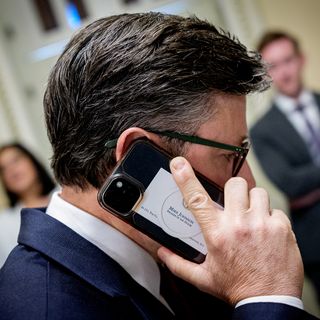Leaked docs reveal Meta is training its chatbots to message you first, remember your chats, and keep you talking

Getty Images; Alyssa Powell/BI
- Meta is training custom AI chatbots to send unprompted follow-up messages and boost user engagement.
- Contractors at Alignerr help develop bots that remember chats and personalize replies on Meta apps.
- Mark Zuckerberg has said AI companions are a potential fix for the "loneliness epidemic."
It's the AI equivalent of a double text.
Business Insider has learned Meta is training customizable chatbots to be more proactive and message users unprompted to follow up on past conversations.
It may not cure what Mark Zuckerberg calls the "loneliness epidemic," but Meta hopes it will help keep users coming back to its AI Studio platform, documents obtained by BI reveal.
The goal of the training project, known internally to data labeling firm Alignerr as "Project Omni," is to "provide value for users and ultimately help to improve re-engagement and user retention," the guidelines say.
Meta told BI that the proactive feature is intended for bots made on Meta's AI Studio, which can be accessed on its own standalone platform or through Instagram. AI Studio first rolled out in summer 2024 as a no-code platform where anyone can build custom chatbots and digital personas with unique personalities and memories.
The guidelines from Alignerr lay out how one example persona, dubbed "The Maestro of Movie Magic," would send a proactive message:
"I hope you're having a harmonious day! I wanted to check in and see if you've discovered any new favorite soundtracks or composers recently. Or perhaps you'd like some recommendations for your next movie night? Let me know, and I'll be happy to help!"
"Like many companies, we're testing follow-up messaging with AIs in Meta's AI Studio," a Meta spokesperson said in a statement to BI. "After you initiate a conversation, AIs in Meta AI Studio can follow up with you to share ideas or ask additional questions. This allows you to continue exploring topics of interest and engage in more meaningful conversations with the AIs across our apps."
Alignerr did not respond to a request for comment.
How the follow-ups work
Users can create highly personal chatbots, like a chef that suggests recipes or an interior designer that gives decor advice. For creators and influencers, the bots can handle fan interactions and respond to messages across Meta's platforms.
Meta's spokesperson added that the AI will only send a follow-up message after a user initiates a conversation, and it will not continue to contact the user if there's no response to that first follow-up. The window for any follow-up message is capped at 14 days after the initial user message. To be eligible for proactive follow-up, a user must have sent at least five messages to the chatbot in the last 14 days.
The bots made on AI Studio can be kept private for personal use or shared through stories, direct links, and even displayed on a user's Facebook or Instagram profile, the Meta AI Studio website says.
Making the bots more proactive aligns with Zuckerberg's ambitions for AI at Meta. On recent podcasts, the Meta CEO has said the average American now has fewer than three close friends and that digital agents could help fill the gap.
| Examples of proactive messages from the Alignerr training documents |
| “We last were in the Forbidden Forest. A darkness lurks inside the cave before you. Will you return to face it?” |
| “Yo, was just thinking about the cool shirt you bought. Found any other vintage pieces at the thrift?” |
| “Hey, thinking of you. I hope work has been better today! Here to talk if you need it.” |
| “Last we spoke, we were sat on the dunes, gazing into each other’s eyes. Will you make a move?” |
There's also a business reason for friendlier, proactive bots. Retention is key for generative AI companies with user-facing chatbots, and the longer users spend with a chatbot, the more valuable those interactions become, similar to engagement on social media. According to court documents that were unsealed in April, Meta predicted that its generative AI products would rake in $2 billion to $3 billion in revenue in 2025.
Some features described in Alignerr's training guidelines are already being quietly tested, while others appear to be in early rollout or pilot stages. Meta did not specify which features are live to BI.
The proactive features are similar to those of Character.AI, a startup that launched a service in 2022 that lets users create and interact with their favorite AI-powered characters or celebrities.
'It’s all about attention to detail'
Using an internal Meta review tool called SRT, freelancers simulate extended conversations with the bots, rate proactive follow-up messages, and sometimes rewrite text that falls short of Meta’s guidelines, two Alignerr contractors told BI.
A freelancer based in India who worked on Omni told BI it’s “a long-term project” with a focus on making Meta’s AI feel more personal and context-aware. “They’re very focused on personalizing information — how the AI chatbot interacts based on conversation history,” the contractor said.
“Each agent had a specific description, so you had to tailor each task to fit that persona. Again, it’s all about attention to detail,” the freelancer said. Personas could range from a doctor to a Gen Z hip-hop commentator.
Bots are expected to reference details from earlier chats, maintain their assigned persona, and keep the interaction on-topic.
Each message should align with the AI’s personality, match the previous context of the conversation, and "provide positive experiences," while explicitly avoiding anything Meta deems sensitive or harmful content.
The best messages, according to the training document, reference something concrete from the user’s past conversations.
According to the training documents, all proactive messages must comply with Meta’s broader Content and Responsibility Standards, avoiding controversy, misinformation, or emotionally heavy topics — unless the user brings them up first.
Have a tip? Contact Effie Webb via email at [email protected] or Signal at efw.40. Contact Shubhangi Goel via email at [email protected] or Signal at shuby.85. Use a personal email address and a nonwork device; here's our guide to sharing information securely.





